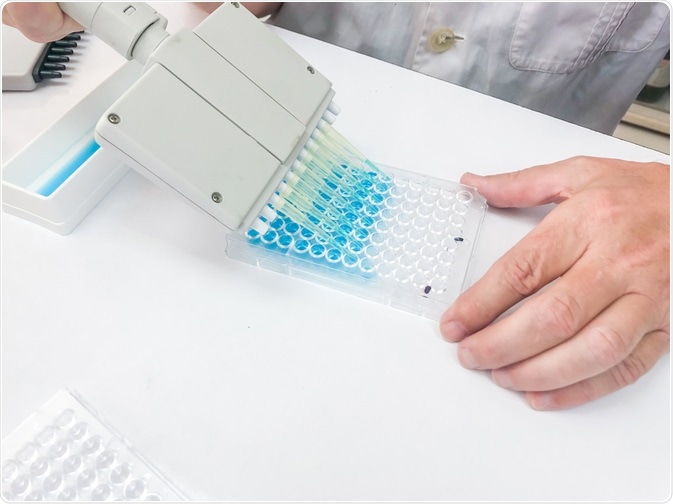When the body encounters a pathogen, it typically launches an immune response involving the production of antibodies specific to that pathogen. After years of research into this process, it is now possible to engineer monoclonal antibodies to recognize specific pathogens. These antibodies can be used to positively identify a pathogen and in turn, play an important role in diagnostics.

Image Credit: AnaLysiSStudiO/Shutterstock.com
The development of monoclonal antibodies by Kohler and Milstein in 1975 was a landmark achievement for biotechnology. They fused B cells (white blood cells capable of producing antibodies) with myeloma cells (cancerous cells arising from lymphocytes), to produce a new cell type that could not only produce antibodies but also rapidly divide, giving rise to large numbers of antibody-producing cells. These cells can be engineered to produce antibodies specific to target antigens.
Since then, monoclonal antibodies have been used in a huge range of clinical applications, most notably in diagnostics and therapies. Monoclonal antibodies can now be used in the diagnosis of a range of human diseases, from cancer to infectious diseases such as pneumonia, and even infertility.
Antibodies in simple diagnostic tests
One of the most common uses of monoclonal antibodies is in simple diagnostic tests, such as pregnancy tests. During pregnancy, the body produces human chorionic gonadotrophin (hCG).
Pregnancy tests can be done on blood or urine and use monoclonal antibodies to detect the presence of hCG. In the case of urine-based pregnancy tests, if hCG is detected by the antibody, a positive band appears alongside the control, indicating pregnancy. This is a readily available, low-cost rapid test that is used every day across the world.
Antibodies in the diagnosis of infectious diseases
The development of monoclonal antibodies for disease diagnosis is a long process, as each disease requires its own specific antibody to be developed and tested. One common test is that for infection with Helicobacter pylori.
Although H. pylori can be isolated in culture for diagnostic purposes, antibody-based methods offer more specificity in terms of the particular strain present, as well as offering advantages in the way of being less complex, as well as being inexpensive and relatively fast. Antibody-based tests often utilize the enzyme-linked immunosorbent assay (ELISA) technique, allowing a large number of tests to be carried out automatically in parallel.
Antibodies in the diagnosis of cancer
Antibodies are commonly used in the diagnosis of cancer, though they can be used in different ways. One method involves engineering monoclonal antibodies to target cancerous cells and then bind, or ‘clump’ them together, making a cancerous tumor easier to identify.
Alternatively, monoclonal antibodies targeting cancerous cells can be radiolabelled, which provides increased options for imaging.
Antibodies in the diagnosis of infertility
The diagnosis of infertility with antibodies is slightly different from other diagnostics. Both males and females can produce anti-sperm antibodies (ASAs), which can be found in semen, blood, or cervicovaginal secretions. The presence of ASAs does not always indicate infertility, as different types of ASAs may interact with sperm in different ways and at different stages.
Although the extent of the role of ASAs in infertility is unclear, it is widely agreed that some ASAs can act at the point of fertilization, inhibiting the process and as a result impacting fertility. Tests for the presence of ASAs can be used in the diagnosis of infertility and may provide more insight to couples trying to conceive.
Antibodies in allergy diagnosis
Allergies arise when the immune system produces antibodies to non-pathogenic materials such as dust mites or animal dander. The particular antibody involved is known as Immunoglobulin E (IgE). A blood test may be carried out to determine the level of IgE in the blood- a high level indicating the presence of allergies.
Additionally, tests can also be done for allergen-specific IgE, to determine the particular allergen affecting the individual. This is a simple and widespread test that is commonly used for allergy diagnosis.
Conclusion
The use of antibodies in diagnostics is incredibly varied with numerous different applications. This article does not cover all of the ways in which antibodies may play a role in diagnostics but gives a few examples to illustrate some of the key uses.
Antibody-based diagnostics is a major area of biotechnology, particularly since the production of monoclonal antibodies. It offers a minimally invasive, cost-effective approach that can be modified for a range of rapid tests, singularly or in parallel (with the use of ELISA).
The low cost means that simple diagnostic tests, such as the pregnancy test, are readily available for widespread use, but also that even the relatively more complex lab-based tests are more accessible. These advantages mean that future research is likely to involve adapting monoclonal antibodies for further diagnostic use in more areas.
Sources:
- Chard T. (1992). Pregnancy tests: a review. Human reproduction (Oxford, England), 7(5), 701–710. https://doi.org/10.1093/oxfordjournals.humrep.a137722
- Goldenberg D. M. (1993). Monoclonal antibodies in cancer detection and therapy. The American journal of medicine, 94(3), 297–312. https://doi.org/10.1016/0002-9343(93)90062-t
- Leal, Y. A., Flores, L. L., García-Cortés, L. B., Cedillo-Rivera, R., & Torres, J. (2008). Antibody-based detection tests for the diagnosis of Helicobacter pylori infection in children: a meta-analysis. PloS one, 3(11), e3751. https://doi.org/10.1371/journal.pone.0003751
- Restrepo, B., & Cardona-Maya, W. (2013). Antisperm antibodies and fertility association. Actas urologicas espanolas, 37(9), 571–578. https://doi.org/10.1016/j.acuro.2012.11.003
Further Reading
Last Updated: Sep 1, 2021